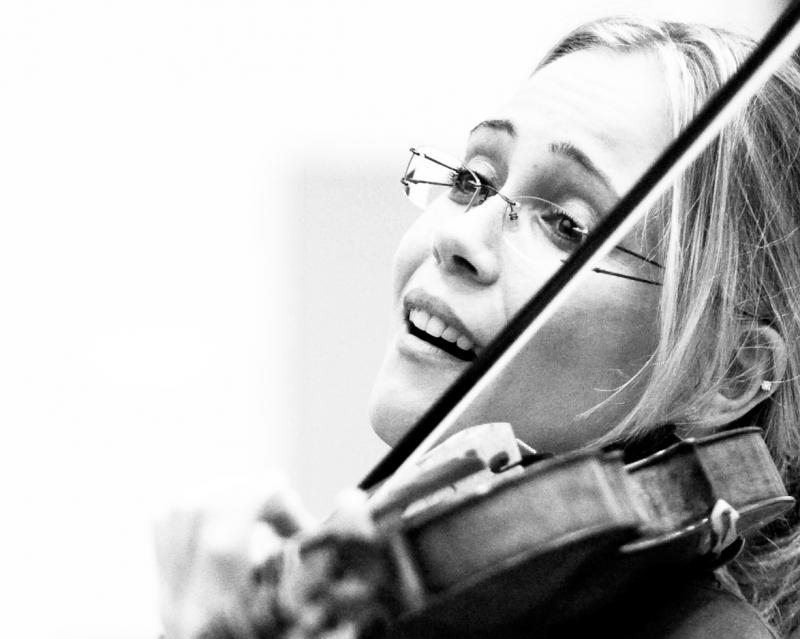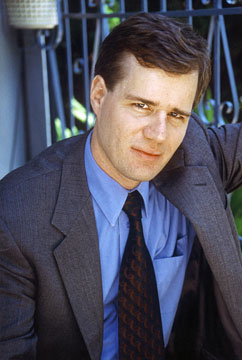Josefowicz, Novacek, Wigmore Hall | reviews, news & interviews
Josefowicz, Novacek, Wigmore Hall
Josefowicz, Novacek, Wigmore Hall
A compelling duo runs the gamut from Schumann to Adams

Who knew that the wisdom of crowds could be quite so fickle or so fallible? This superb recital by the American violinist Leila Josefowicz and pianist John Novacek was played in front of a Wigmore Hall only about a quarter-full. Josefowicz, returning to the Wigmore after five years, wasn't ruffled in the slightest.
The duo carried off this London recital with huge panache and professional energy. Theirs has become a seasoned and secure musical partnership; their ways of working together are now completely attuned. She has the freedom to be impulsive, explosive, coquettish, to go anywhere. He can support, change the backdrop, challenge and provoke her. It was a compelling performance from first note to last.
 This musical partnership also took the listener straight to the heart of each composer's idiom. From the opening work by Manuel de Falla, Josefowicz captivated with the breadth of her range of tonal colour. Serenity then came in Messiaen's Thème et Variations, where the violinist brought magic to the half-lights of the closing section, with its final journey to the borders of silence.
This musical partnership also took the listener straight to the heart of each composer's idiom. From the opening work by Manuel de Falla, Josefowicz captivated with the breadth of her range of tonal colour. Serenity then came in Messiaen's Thème et Variations, where the violinist brought magic to the half-lights of the closing section, with its final journey to the borders of silence.
Nothing is ever bland or predictable in playing like this. What is most remarkable is that Josefowicz can play with such impetuousness; one has the sense it shouldn't really be working at all, and yet it always does. In the Schumann A Minor Sonata's opening movement she would take one phrase and caress and charm with it, then put a huge balloon into the next one and remove all sense of proportion from it, and then aggress the next one and kick it down the stairs. This should – and normally would – come across as affected or mannered, and yet it never does. When every moment is lived with total conviction, then every expressive choice justifies itself. In the Schumann, Novacek (pictured above) was also very subtle with the sustain pedal, adept at signalling changes of mood with the slightest of caesuras in the line.
The second half brought Conversio, a 1994 work by the Estonian composer Erkki-Sven Tüür, and John Adams' Road Movies, also from the mid-1990's. In the Tüür, both players demonstrated that they don't just know the work's irregular and constantly evolving rhythmic patterns, they can also live with them and in them, and make them dance and sing.
In the Adams, the performers' tricky task is to find the humour and the variety in music which wears its machine-like repetitiveness like a badge of pride. Josefowicz and Novacek found and conveyed exactly the right echoes and shimmers of both Bartok and bluegrass. Road Movies has one of those annoying anti-endings, where the piece simply runs out of road. So, as the single encore, the pair gave an arrangement of Charlie Chaplin's Smile – by Claus Ogermann? – in which every flautando harmonic glimmered with beauty. What a wonderful evening, enjoyed by far too few people.
rating
Explore topics
Share this article
The future of Arts Journalism
You can stop theartsdesk.com closing!
We urgently need financing to survive. Our fundraising drive has thus far raised £49,000 but we need to reach £100,000 or we will be forced to close. Please contribute here: https://gofund.me/c3f6033d
And if you can forward this information to anyone who might assist, we’d be grateful.

Subscribe to theartsdesk.com
Thank you for continuing to read our work on theartsdesk.com. For unlimited access to every article in its entirety, including our archive of more than 15,000 pieces, we're asking for £5 per month or £40 per year. We feel it's a very good deal, and hope you do too.
To take a subscription now simply click here.
And if you're looking for that extra gift for a friend or family member, why not treat them to a theartsdesk.com gift subscription?
more Classical music
 Willis-Sørensen, Ukrainian Freedom Orchestra, Wilson, Cadogan Hall review – romantic resilience
Passion, and polish, from Kyiv's musical warriors
Willis-Sørensen, Ukrainian Freedom Orchestra, Wilson, Cadogan Hall review – romantic resilience
Passion, and polish, from Kyiv's musical warriors
 BBC Proms: The Marriage of Figaro, Glyndebourne Festival review - merriment and menace
Strong Proms transfer for a robust and affecting show
BBC Proms: The Marriage of Figaro, Glyndebourne Festival review - merriment and menace
Strong Proms transfer for a robust and affecting show
 BBC Proms: Faust, Gewandhausorchester Leipzig, Nelsons review - grace, then grandeur
A great fiddler lightens a dense orchestral palette
BBC Proms: Faust, Gewandhausorchester Leipzig, Nelsons review - grace, then grandeur
A great fiddler lightens a dense orchestral palette
 BBC Proms: Jansen, Royal Concertgebouw Orchestra, Mäkelä review - confirming a phenomenon
Second Prom of a great orchestra and chief conductor in waiting never puts a foot wrong
BBC Proms: Jansen, Royal Concertgebouw Orchestra, Mäkelä review - confirming a phenomenon
Second Prom of a great orchestra and chief conductor in waiting never puts a foot wrong
 BBC Proms: Royal Concertgebouw Orchestra, Mäkelä review - defiantly introverted Mahler 5 gives food for thought
Chief Conductor in Waiting has supple, nuanced chemistry with a great orchestra
BBC Proms: Royal Concertgebouw Orchestra, Mäkelä review - defiantly introverted Mahler 5 gives food for thought
Chief Conductor in Waiting has supple, nuanced chemistry with a great orchestra
 Dunedin Consort, Butt / D’Angelo, Muñoz, Edinburgh International Festival 2025 review - tedious Handel, directionless song recital
Ho-hum 'comic' cantata, and a song recital needing more than a beautiful voice
Dunedin Consort, Butt / D’Angelo, Muñoz, Edinburgh International Festival 2025 review - tedious Handel, directionless song recital
Ho-hum 'comic' cantata, and a song recital needing more than a beautiful voice
 Classical CDs: Dungeons, microtones and psychic distress
This year's big anniversary celebrated with a pair of boxes, plus clarinets, pianos and sacred music
Classical CDs: Dungeons, microtones and psychic distress
This year's big anniversary celebrated with a pair of boxes, plus clarinets, pianos and sacred music
 BBC Proms: Liu, Philharmonia, Rouvali review - fine-tuned Tchaikovsky epic
Sounds perfectly finessed in a colourful cornucopia
BBC Proms: Liu, Philharmonia, Rouvali review - fine-tuned Tchaikovsky epic
Sounds perfectly finessed in a colourful cornucopia
 BBC Proms: Suor Angelica, LSO, Pappano review - earthly passion, heavenly grief
A Sister to remember blesses Puccini's convent tragedy
BBC Proms: Suor Angelica, LSO, Pappano review - earthly passion, heavenly grief
A Sister to remember blesses Puccini's convent tragedy
 BBC Proms: A Mass of Life, BBCSO, Elder review - a subtle guide to Delius's Nietzschean masterpiece
Mark Elder held back from blasting the audience with a wall of sound
BBC Proms: A Mass of Life, BBCSO, Elder review - a subtle guide to Delius's Nietzschean masterpiece
Mark Elder held back from blasting the audience with a wall of sound
 BBC Proms: Le Concert Spirituel, Niquet review - super-sized polyphonic rarities
Monumental works don't quite make for monumental sounds in the Royal Albert Hall
BBC Proms: Le Concert Spirituel, Niquet review - super-sized polyphonic rarities
Monumental works don't quite make for monumental sounds in the Royal Albert Hall
 Frang, Romaniw, Liverman, LSO, Pappano, Edinburgh International Festival 2025 review - sunlight, salt spray, Sea Symphony
Full force of the midday sea in the Usher Hall, thanks to the best captain at the helm
Frang, Romaniw, Liverman, LSO, Pappano, Edinburgh International Festival 2025 review - sunlight, salt spray, Sea Symphony
Full force of the midday sea in the Usher Hall, thanks to the best captain at the helm

Add comment